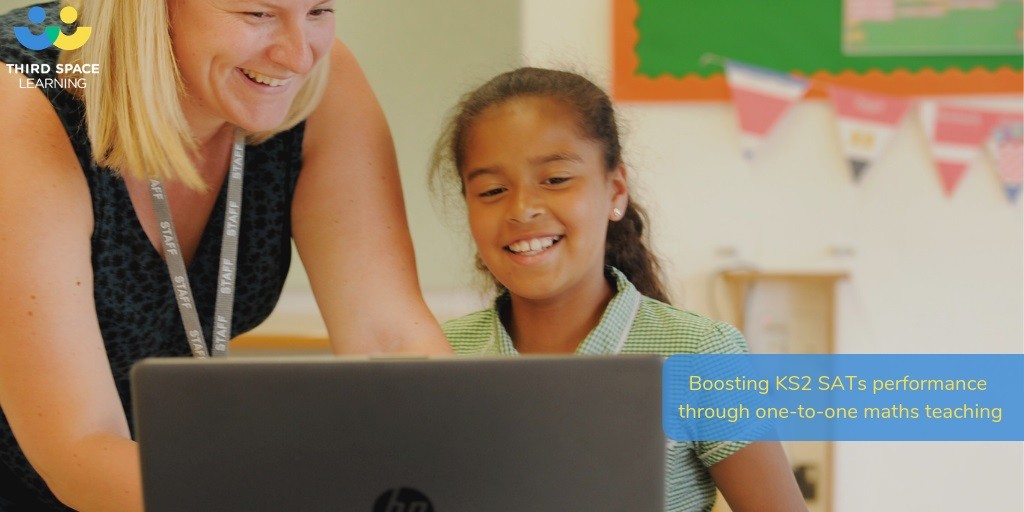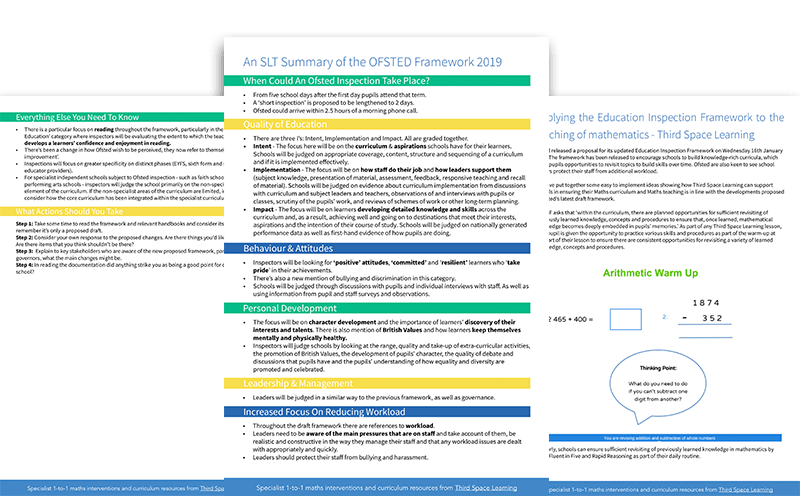Ofsted’s Primary Maths Framework: Applying The EIF To The Teaching Of Mathematics
As part of our work reviewing the new Ofsted framework we’ve naturally looked in depth at what is said about the teaching of mathematics, and what inspectors will be looking for.
The following guidance and support are taken from page 88 of the new Ofsted Handbook, under the section Applying The EIF To The Teaching of Mathematics.
We asked the our own curriculum experts to reflect on how they ensure that the Third Space teaching and learning approach follow similar best practice to that recommended by Ofsted. The answers are relevant for all curriculum leaders and maths subject leaders.
The new framework has been released to encourage schools to build knowledge-rich curricula, which allow pupils opportunities to revisit topics to build skills over time. Ofsted are also keen to see school leaders protect their staff from additional workload.
If you’re not already familiar with the changes to the new Ofsted framework 2019, it’s also worth reviewing the Ofsted consultation 2019 results, our comprehensive look at Ofsted ratings, this article on primary maths curriculum planning and our indepth review of what an Ofsted deep dive looks like.
Breakdown Of The 2019 Ofsted Inspection Framework Announcement
Download the key elements from the government announcement here, in the form of an easy to read, 2 page PDF. Perfect to share in your SLT and governor meetings!
Download Free Now!What Inspectors Will Be Looking for in The Teaching of Maths
While we continue to develop our own maths curriculum the following are some ways that Third Space Learning supports schools to ensure their maths curriculum and maths teaching are in line with the EIF.
During an Ofsted deep dive of mathematics, inspectors will evaluate the quality of a school’s mathematics education through lesson visits, discussions with pupils and scrutiny of their work, reviewing curriculum plans, discussions with curriculum leaders, and examining any published data.
From Page 88 of The Ofsted School Inspection Handbook
Opportunities to practise previously learned knowledge
The EIF asks that
◼ within the curriculum, there are sufficient opportunities planned to revisit previously learned knowledge, concepts and procedures; this is to ensure that, once learned, mathematical knowledge becomes deeply embedded in pupils’ memories.
As part of any Third Space Learning one-to-one tutoring session, each pupil is given the opportunity to practise various skills and procedures as part of the warm-up at the start of their lesson to ensure there are consistent opportunities for revisiting a variety of learned knowledge, concepts and procedures.

Within the Third Space Maths Hub of resources, many resources follow a deliberate progression to enable school to revisit previously learned knowledge in mathematics.
- Fluent in Five provides daily arithmetic practice
- Rapid Reasoning has over 2,800 reasoning questions for years 3 to 6
- Code Crackers is a selection of maths activities designed to build spaced retrieval practice

Objective assessments to gauge learning
The EIF asks that
◼ there are objective assessments that can identify when all pupils have gained the intended understanding and unconscious competence in knowledge, concepts and procedures necessary before they move on to new or more complex content
The Maths Hub also includes over 50 Pre- and Post-Unit Assessments on all topics from the primary national curriculum for KS2 maths. These follow a specific diagnostic quiz style format to ensure that teachers can pinpoint exactly what a child’s misconception might be.

Expert maths teaching
The EIF asks that
◼ all teachers of mathematics, including non-specialist teachers of mathematics, have sufficient mathematical and teaching content knowledge to deliver topics effectively
Within the Maths Hub we have hundreds of professional development videos, including our Maths in Minutes series of bitesize teaching guidance for teachers and TAs as well as Maths Masterclass best practice videos from leading primary maths practitioners.
Moreover, the tutors we recruit to teach our maths curriculum in the online interventions are all maths specialists by degree or training, and receive regular CPD.
Developing pupils’ mathematical knowledge
The EIF asks that
◼ pupils’ mathematical knowledge is developed and used, where appropriate, across the curriculum
The Third Space Learning blog has long been a first choice destination for those looking for new KS1 or KS2 maths activities, many of them cross-curricular; start with these outdoor maths activities or this article on how cross-curricular learning can bring maths to life.
Regular reasoning and problem solving
The EIF asks that
◼ the school’s curriculum identifies opportunities when mathematical reasoning and solving problems will allow pupils to make useful connections between identified mathematical ideas or to anticipate practical problems they are likely to encounter in adult life.
The 1-to-1 intervention lessons led by Third Space Learning’s specialist Maths tutors always include reasoning as well as arithmetic questions, using real life examples where possible.

Opportunities to catch up in maths
The EIF asks that:
◼Those pupils behind age-related expectations are provided with the opportunities to learn the mathematical knowledge and skills necessary to catch up with their peers
This final point gets to the core of why Third Space Learning exists. Whatever the reason for an attainment gap in maths, our specialist 1-to-1 Maths interventions deliver 7 months’ progress in just 14 weeks.
So together with your support in school we can make sure that all pupils who are behind AREs catch up with their peers.

Read more
- What do Ofsted look for? How I learnt to stop worrying and love my inspection
- Why you shouldn’t aim for Ofsted outstanding teaching
- A complete guide to the new Ofsted inspection framework
Helpful links
DO YOU HAVE STUDENTS WHO NEED MORE SUPPORT IN MATHS?
Every week Third Space Learning’s specialist school tutors support thousands of students across hundreds of schools with weekly online 1 to 1 maths lessons designed to plug gaps and boost progress.
Since 2013 these personalised one to one lessons have helped over 150,000 primary and secondary students become more confident, able mathematicians.
Learn how the tutoring integrates with your SEF and Ofsted planning or request a personalised quote for your school to speak to us about your school’s needs and how we can help.





![The 12 Most Important Ofsted Safeguarding Questions and Answers [2024]](https://thirdspacelearning.com/wp-content/uploads/2024/02/safeguarding-questions-and-answers-1-180x160.jpg)